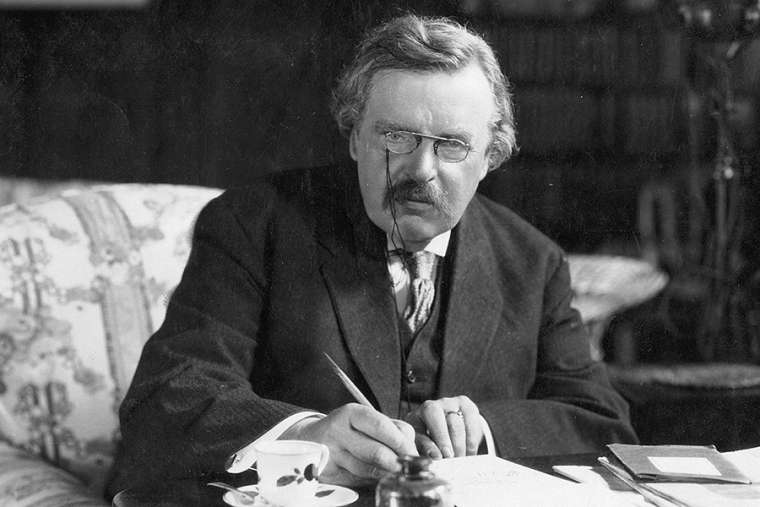ROME – A leading scholar behind the push to advance the canonization of celebrated writer G.K. Chesterton has published a new book making a case for the sainthood of the “prolific” 20th century author, hitting back at critics who see him as unsuited for a halo.
Dale Ahlquist, president of the American Chesterton Society and the Society of Gilbert Keith Chesterton, in December 2018 published Knight of the Holy Ghost, which explores Chesterton’s life and writings and responds to arguments from those who say he was too fat, drank too much, smoked too much and harbored anti-Semitic sentiments.
In comments to Crux, Ahlquist said when people think of Chesterton, they often ask themselves, “How is it that a 300-pound cigar-smoking London journalist could be a saint? He doesn’t fit the image of a saint, because of his amazing size and that halo of smoke around his head.”
However, while the famed author might not fit the bill of pious saints of the past who prayed their way into heaven in monasteries and convents, he exhibited heroic humility, Ahlquist said. In his view, Chesterton was “a great genius who really had the ability to annihilate his opponents if he wanted to, but he always treated them with charity.”
“He always gave everyone the benefit of the doubt. He never flaunted his great genius, but he always made everyone feel better about themselves,” he said, and voiced hope that Chesterton’s cause for sainthood, which recently finished the initial stages, would soon move forward.
One of the best-known writers in the 20th century, Gilbert Keith Chesterton was born May 9, 1874, and died June 14, 1936. A convert to Catholicism, he was widely considered one of the most influential writers of his time.
While in the United States he is best known for his book Orthodoxy, a groundbreaking defense of Christianity, Chesterton is most famous in his homeland for his Father Brown series, a collection of short stories about a priest detective more dedicated to converting the criminals he catches than incarcerating them.
In 2013, Bishop Peter Doyle of Northampton ordered that an initial investigation into the possibility of Chesterton’s sainthood be opened and tapped Canon John Udris for the task.
Udris completed his preliminary investigation in the summer of 2018 and filed his final report with Doyle. According to Ahlquist, the next step would be for Doyle to approach the Vatican’s Congregation for the Causes of Saints for a nihil obstat, meaning a declaration that “nothing stands in the way” of the cause going forward.
Once that happens, a “petitioner,” meaning the one who formally asks for the cause to be opened, will be named and selects a postulator in charge of carrying the cause forward.
Ahlquist said he does not know whether any of these steps have yet been taken, but voiced hope that there will be fresh movement soon and that the Society of Gilbert Keith Chesterton would be chosen as the petitioner.
“We’re hoping it will be very soon,” he said, but said that in the meantime, devotion to Chesterton continues to grow not only in England, but internationally, with a large portion of devotees coming from the United States, Italy, Croatia, Brazil and Argentina.
One on the main intentions people ask Chesterton’s intercession for is fertility, Ahlquist said, noting that Chesterton and his wife Frances were unable to have children. Other people ask for healing, he said, noting that there have already been potential cases of healings brought forward that could be presented as potential miracles later in the sainthood process.
The main stumbling blocks, he said, are accusations of anti-Semitism and a lack of temperance, as Chesterton was a large man who smoked and drank a lot, and who died after the Nazi party had already risen to power in Germany but before the Holocaust.
Calling Chesterton anti-Semitic is “a very tragic portrayal, because it’s simply not true,” Ahlquist said, and insisted that despite Chesterton’s size, he was no glutton. Rather, he said, most accounts of Chesterton’s life suggest that he ate little, meaning he likely had a glandular condition that caused him to gain weight.
“As for his drinking, it was all very convivial, he wasn’t a solitary drinker, he wasn’t a drunk, but he defended drinking at the time of prohibition,” Ahlquist said, adding that this last detail “has to be remembered, he was fighting against the puritans.”
In Ahlquist’s view, Chesterton was “prophetic” in his writings, speaking to a modern crisis in politics, education, economics and the at-times troubled relationship between family and state, despite having died nearly 100 years ago.
“He really had a handle on a Catholic interpretation of the modern world. The other thing is that he really represents a joyful Christian. He really has a wit and joy that he brings to the faith,” Ahlquist said, and compared Chesterton to 15th century martyr St. Thomas More.
In addition to sharing Chesterton’s humor and intelligence, “More is more important now than he was in his own time, and he’ll be more important in the future than he is now,” Ahlquist said, adding that he expects the same dynamic will be true of Chesterton.
Having written hundreds of books and thousands of essays, Ahlquist said it would be impossible to say one of Chesterton’s works was more important than another, though he pointed to Chesterton’s writings on the saints and apologetics as well as his Father Brown series as among the more important.
What makes Chesterton a great mystery writer, he said, is that “he tells you the truth that’s been sitting in front of your face but you didn’t see, and that’s the whole essence of detective activities,” and this goes for the faith too.















